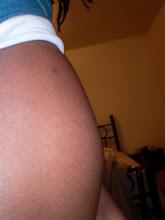I am quiet sure i confused some of you with the whole RH ting, so here is a blurb on it.
We don't often give much thought to the blood work of early pregnancy. Many of us never hear another word about those droplets given in the early weeks. However, one of the tests performed with this blood is a blood type and factor screening.
In addition to the blood group (A, B, O, AB), the Rh factor is written as either positive (present) or negative (absent). Most people are Rh positive. This factor does not effect your health except during pregnancy.
A woman is at risk when she has a negative Rh factor and her partner has a positive Rh factor. This combination can produce a child who is Rh positive. While the mother's and baby's blood systems are separate there are times when the blood from the baby can enter into the mother's system. This can cause the mother to create antibodies against the Rh factor, thus treating an Rh positive baby like an intruder in her body. If this happens the mother is said to be sensitized.
A sensitized mother's body will make antibodies. These antibodies will then attack an Rh positive baby's blood, causing it to breaking down the red blood cells of the baby and anemia will develop. In severe cases this hemolytic disease can cause illness, brain damage and even death.
Sensitization can also occur during a blood transfusion, miscarriage, abortion, ectopic pregnancy and even during some procedures, like amniocentesis. Since the antibodies do not disappear and rarely cause a problem in first pregnancies, it is very important to be screened thoroughly and give an accurate medical history to your doctor or midwife.
The Good News
Hemolytic disease can be prevented for many women, if they are not already sensitized. Rh immunoglobulin (RhIg) is a blood product given via injection to help the Rh negative mother by suppressing her ability to react to the Rh positive red cells. Reactions to the medication are generally minor, including soreness at the injection sight and sometimes a slight fever.
Since a small number of unsensitized women may have problems with the end of pregnancy, many practitioners recommend that she be given an injection of RhIg (also known as Rhogam) at 28 weeks gestation, to prevent the few cases of sensitization that occur at the end of pregnancy. Each dose of RhIg lasts about 12 weeks. The mother will also be given RhIg within 72 hours of birth if the child is Rh positive. The baby's blood type can be determined easily after birth by cord blood samples.
RhIg may also be given after an amniocentesis, miscarriage, abortion or postpartum sterilization (tubal ligation).
Hemolytic Disease
There are about 5,000 cases of hemolytic disease that will occur each year. A mother who is Rh sensitized will be screened throughout her pregnancy to see if the baby has hemolytic disease. Some babies who have hemolytic disease will have uncomplicated pregnancies and be born at a normal gestation. Other babies will suffer severely and require the birth to be done earlier. Blood transfusions can be given both before and after birth for these severely affected infants.
If you have questions about the Rh factor or whether or not you are in this group of women, do not hesitate to ask your doctor or midwife for the results of your blood work.
Thursday, January 29, 2009
Subscribe to:
Post Comments (Atom)





Wow didn't know this.. Learned something again today..
ReplyDelete